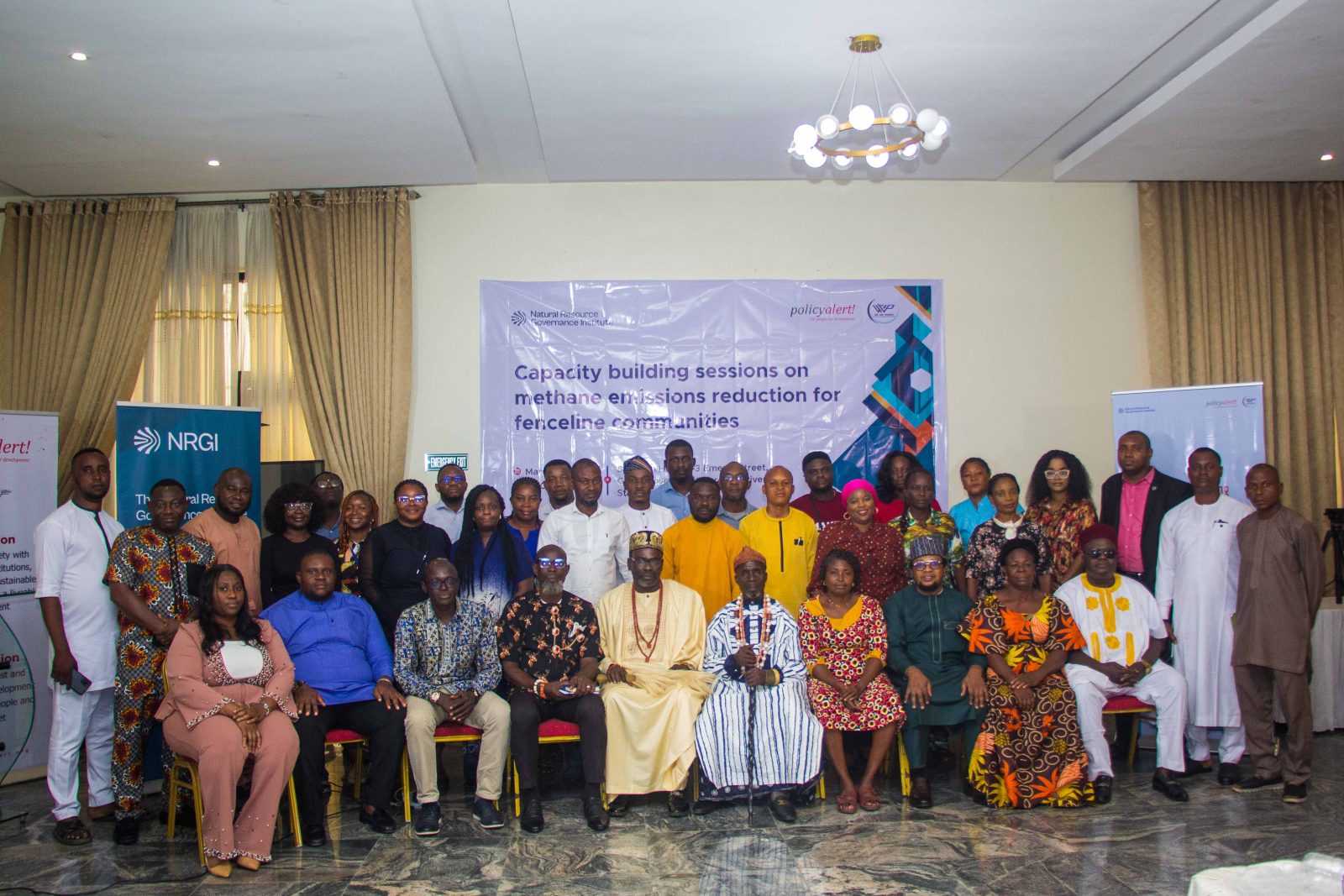Reduce Methane Emissions Now- Niger Delta Communities Tell FG, Oil Companies

By Ekemini Simon
As oil and gas host communities in the Niger Delta continue to grapple with the negative impact of gas flaring, stakeholders from these communities have called on the government of Nigeria and fossil fuel companies to take urgent action towards reduction of petroleum-related methane emissions in the region.
The call was made, Wednesday, during a workshop in Port Harcourt, Rivers State, organized by Policy Alert in collaboration with the Natural Resources Governance Institute (NRGI) and We The People.
The event brought together community leaders, traditional rulers, civil society organizations, and environmental advocates to address the urgent need to mitigate methane emissions from Nigeria’s oil and gas sector and empower extractive communities with the knowledge and tools for informed advocacy campaigns on the issue.
In their respective remarks, representatives of these communities complained of the health, environmental and livelihood hazards caused by methane emission especially in the form of gas flaring and venting.
They noted that the oil companies do not care about the hazards the communities face for the over six decades of gas flaring but will rather prefer to pay gas flare penalties as an easy way out while the communities do not benefit from the flare penalties.
The stakeholders asked the Federal Government through the Nigerian Upstream Petroleum Regulatory Commission to ensure adherence and implementation of Gas Flare Elimination Plan as provided for in the Petroleum Industry Act stressing that the methane emitted through gas flaring and venting by fossil fuel companies has thrown Niger Delta into a state of ecological disaster and health emergencies.
While asking the National Assembly to review relevant laws for stiffer penalties on gas flaring thus discourage the companies from flaring, the Communities asked that the penalties paid so far be immediately used for environmental remediation and relief of the host communities as provided for in the PIA.
They also demanded that the NUPRC uptake gas destined for flaring towards utilization for energy in accordance with the provisions of the PIA stressing that this will not only relief the communities from the hazards of methane emission will be stop the economic waste of gas.
Earlier, Tijah Bolton-Akpan, Executive Director of Policy Alert, during his welcome remark, underscored the critical relevance of methane emissions discussions for fenceline communities. He stated, “Nigeria is a significant methane emitter, particularly within its oil and gas sector, with emissions stemming from gas flaring, venting, and fugitive emissions. In 2022, the country ranked seventh in the list of top gas flaring countries and, as of 2020, methane emissions from the country’s oil and gas sector accounted for 41 percent of Nigeria’s total greenhouse gas emissions. This constitutes a major climate threat and a significant risk to fenceline communities, who have to cope with the degraded ecosystem, health complications, and compromised livelihoods. Empowering these communities with knowledge is a vital step toward demanding accountability and encouraging sustainable solutions.”

Ken Henshaw, Executive Director of We The People, stated: “Methane emissions severely impact human health, causing respiratory illnesses, skin diseases, and ground-level ozone formation, with disproportionate effects on children, women, and the elderly in these communities. The loss of viable farmland and destruction of fishing grounds due to methane emissions also cause significant economic hardship for community people. This workshop, therefore, provided a space for them to express their concerns about the lack of accountability by government and companies on existing commitments to monitor and reduce methane emissions, as well as the limited enforcement of existing environmental regulations.”
Tengi George-Ikoli, Senior Program Officer at NRGI, stressed the urgent need to hold government and oil companies to consistent global standards. She said, “Nigeria’s oil and gas sector must align with the same environmental benchmarks imposed on developed nations. We cannot accept double standards that perpetuate harm to local populations. Robust enforcement of commitments, such as the 2030 gas flaring phase-out, is essential to ensure tangible outcomes for affected communities.”

Participants noted that increased community participation in environmental monitoring and decision-making processes is essential for Nigeria to make any real progress in its methane reduction targets. They also recommended ramping up of investments in alternative energy sources, such as solar, to reduce reliance on fossil fuels, and stricter regulations on gas flaring, including enforcement of flare penalties and utilisation of collected fines for environmental remediation of affected communities as provided for in the Petroleum Industry Act 2021.
The event concluded with Civil society organizations (CSOs) pledging to provide technical support to communities to improve their advocacy efforts and participants agreeing to conduct step-down training in their communities on the impacts of methane emissions to further help them engage regulators and oil companies operating in their localities.







